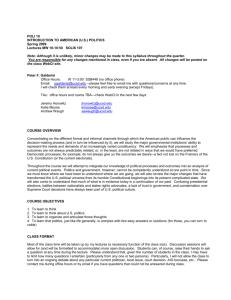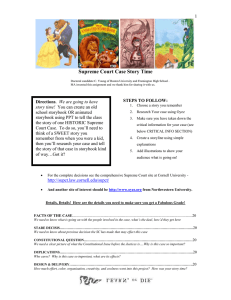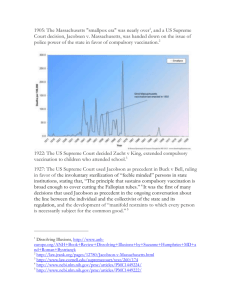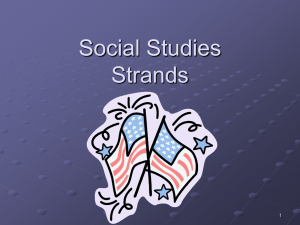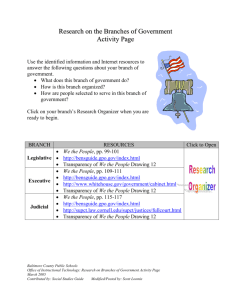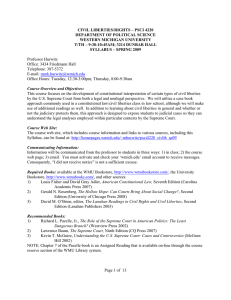CIVIL LIBERTIES/RIGHTS – PSCI 4220 DEPARTMENT OF POLITICAL SCIENCE WESTERN MICHIGAN UNIVERSITY
advertisement
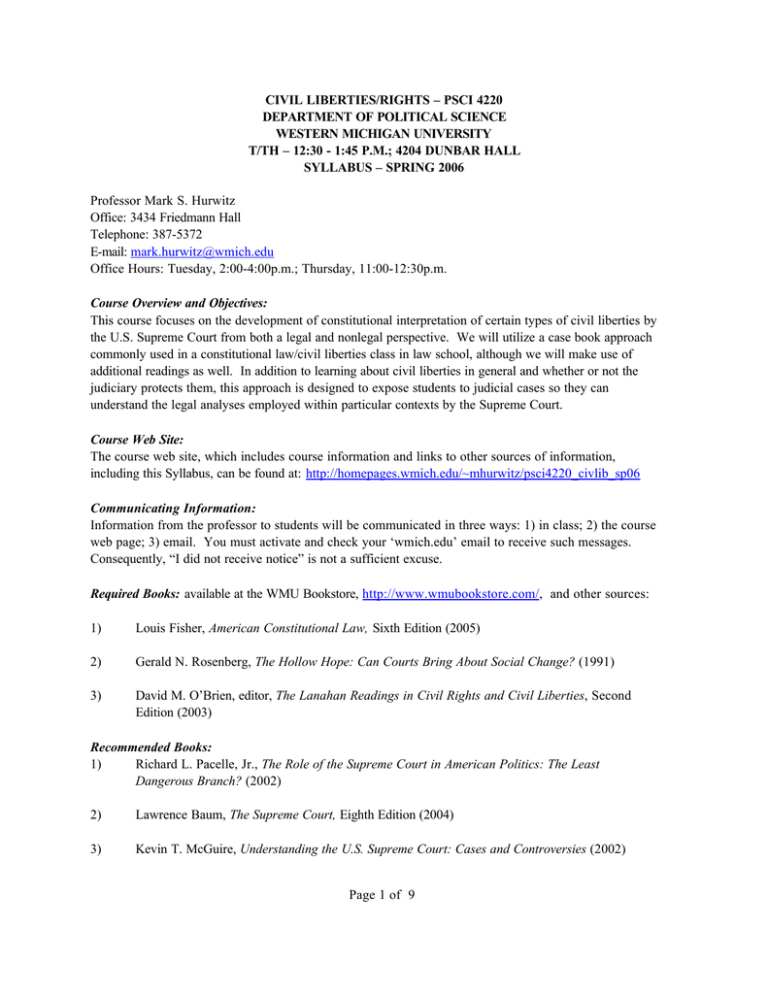
CIVIL LIBERTIES/RIGHTS – PSCI 4220 DEPARTMENT OF POLITICAL SCIENCE WESTERN MICHIGAN UNIVERSITY T/TH – 12:30 - 1:45 P.M.; 4204 DUNBAR HALL SYLLABUS – SPRING 2006 Professor Mark S. Hurwitz Office: 3434 Friedmann Hall Telephone: 387-5372 E-mail: mark.hurwitz@wmich.edu Office Hours: Tuesday, 2:00-4:00p.m.; Thursday, 11:00-12:30p.m. Course Overview and Objectives: This course focuses on the development of constitutional interpretation of certain types of civil liberties by the U.S. Supreme Court from both a legal and nonlegal perspective. We will utilize a case book approach commonly used in a constitutional law/civil liberties class in law school, although we will make use of additional readings as well. In addition to learning about civil liberties in general and whether or not the judiciary protects them, this approach is designed to expose students to judicial cases so they can understand the legal analyses employed within particular contexts by the Supreme Court. Course Web Site: The course web site, which includes course information and links to other sources of information, including this Syllabus, can be found at: http://homepages.wmich.edu/~mhurwitz/psci4220_civlib_sp06 Communicating Information: Information from the professor to students will be communicated in three ways: 1) in class; 2) the course web page; 3) email. You must activate and check your ‘wmich.edu’ email to receive such messages. Consequently, “I did not receive notice” is not a sufficient excuse. Required Books: available at the WMU Bookstore, http://www.wmubookstore.com/, and other sources: 1) Louis Fisher, American Constitutional Law, Sixth Edition (2005) 2) Gerald N. Rosenberg, The Hollow Hope: Can Courts Bring About Social Change? (1991) 3) David M. O’Brien, editor, The Lanahan Readings in Civil Rights and Civil Liberties, Second Edition (2003) Recommended Books: 1) Richard L. Pacelle, Jr., The Role of the Supreme Court in American Politics: The Least Dangerous Branch? (2002) 2) Lawrence Baum, The Supreme Court, Eighth Edition (2004) 3) Kevin T. McGuire, Understanding the U.S. Supreme Court: Cases and Controversies (2002) Page 1 of 9 NOTE: Chapter 7 of the Pacelle book is an Assigned Reading that is available on-line through the course reserve section of the WMU Library system. Assigned Readings: Readings on course reserve are available on-line through the WMU Libraries system, http://www.wmich.edu/library/access/coursereserve.php Assigned Cases: There are a number of required cases not provided in the Fisher “casebook.” The citation for each such case is provided in the Schedule of Assignments, if the student wants to find them in the library. As well, a URL is provided for each, if the student wants to find them on the internet. Either is acceptable, so long as the student understands that these Assigned Cases are required reading. When reading an Assigned Case, the student must read the majority opinion and all concurring and dissenting opinions. The following web sites house nearly all of the Supreme Court’s cases: http://supct.law.cornell.edu/supct/ http://www.findlaw.com/casecode/supreme.html http://web.lexis-nexis.com.libproxy.library.wmich.edu/universe (accessible through WMU Library system with Bronco NetID) The source of these cases is irrelevant. Nevertheless, cases from these internet sites are not edited, which means that they are much longer than those in the casebook; indeed, many unedited Supreme Court cases are well over 100 pages in length. Thus, it is strongly advised that students purchase the Fisher casebook, as opposed to obtaining all of the cases from the internet, not only because the cases are edited in the casebook, but also because there are readings in the casebook that are unavailable elsewhere. Class Schedule: We meet every Tuesday and Thursday from 12:30-1:45p.m. during the semester, with the exception of the following dates during which class is cancelled: Monday-Friday, February 27-March 3 – Spring Break Thursday, April 20 – Professor attending Midwest Political Science Association Conference (note: if not cancelled, this date would be the last class for this course) Exams and Grading: There will be two (2) mid-term exams, each worth 25% of the final course grade, and a cumulative final exam worth 50% of the final course grade. All of the exams consist of a variety of short-answer question types, with the predominant question type being multiple choice. The exams are based on the entire body of material presented in class and in the assigned readings. Much of the material on the exams is delivered in class and not necessarily in the readings; however, some material from the readings which is not covered in class is tested on the exams as well. The final course grade is based entirely upon performance on these exams, as there is no extra credit in this class. The exam schedule follows: Page 2 of 9 Mid-term #1: Mid-term #2: Final Exam: Tuesday, February 7 (during class) Tuesday, March 14 (during class) Tuesday, April 25, 2:45-4:45p.m. (during final exam period) Grading Scale: The following numerical averages translate into final course grades: 90+: A (4.0) 85-89: BA (3.5) 80-84: B (3.0) 75-79: CB (2.5) 70-74: C (2.0) 65-69: DC (1.5) 60-64: D (1.0) –60: E (0.0) Make-up Exams: It is completely the student’s responsibility to take the exams when they are scheduled. As a general rule, make-up exams will not be allowed; thus, a missed exam counts as a zero (0) toward the final course grade. Notwithstanding, at the professor’s sole discretion make-ups will be permitted, but only the gravest of reasons will be accepted, if documented in writing by the proper authority. Even if there is an acceptable reason for missing the regularly scheduled exam, permission to take a make-up will be granted only if the student provides the professor with prompt and proper notification; that is, the student must inform the professor of the reason for missing the exam with proper documentation before the exam takes place, and the reason must be acceptable to the professor. If a make-up is permitted, both the format and questions can, and likely will, be different from the regularly scheduled exam. Incomplete Grades: Note that the professor does not give grades of Incomplete in this class under any circumstance, as a missed exam counts as a zero (0) toward the final course grade. Academic Honesty and Integrity: Per WMU policy: You are responsible for making yourself aware of and understanding the policies and procedures in the Undergraduate (pp. 274-276) Catalog that pertain to Academic Honesty. These policies include cheating, fabrication, falsification and forgery, multiple submission, plagiarism, complicity and computer misuse. If there is reason to believe you have been involved in academic dishonesty, you will be referred to the Office of Student Conduct. You will be given the opportunity to review the charge(s). If you believe you are not responsible, you will have the opportunity for a hearing. You should consult with the professor if you are uncertain about an issue of academic honesty prior to the submission of an assignment or test. Special Needs: Any student with special needs should inform the professor as soon as possible, so that appropriate accommodations can reasonably be made. Page 3 of 9 Class Procedure: Class will be conducted in a lecture format. Lectures will complement but not regurgitate material from the readings. Notwithstanding, students are encouraged to ask questions or raise issues at any time on the readings, the lecture, or a contemporary issue concerning constitutional law or civil liberties. Assignments: The Schedule of Assignments notes the topics to be covered and the dates for lectures and exams. This schedule will be followed as closely as possible; however, the professor reserves the right to change if necessary, and students will be notified appropriately (in class, email, and/or the web page) of any changes. Additionally, there may be material handed out in class or posted on the class web page (such as current news issues on civil liberties) for which students additionally are responsible. Since this schedule is comprehensive, it is imperative that the students keep up with the material. Schedule of Assignments: Note: All references in the Schedule of Assignments are to the Fisher casebook, unless provided otherwise. A case or reading denoted by * signifies that it is not found in any of the assigned books, and alternate references are supplied; a reading denoted by ** signifies that it is in the Assigned Readings on Course Reserve. I. The Supreme Court, Judicial Power, and the Role of the Supreme Court in Social Policy (January 10 - 19) The Constitution of the United States of America, Appendix 1 Rosenberg: Preface, p. xi; Introduction (pp. 1-8), Chapter 1 (p. 9-36) **Pacelle, Richard L, Jr. 2002. The Role of the Supreme Court in American Politics. Boulder: Westview Press, Chapter 7, pp. 157-169 Constitutional Politics, p. 3 Mechanical Jurisprudence, pp. 3-4 Litigation as a Political Process, pp. 4-7 Judge as Lawmaker, pp. 17-19 School Desegregation, pp. 20 Independent State Action, pp. 20-22 Who Has the Last Word?, pp. 22-24 Walter F. Murphy, Who Shall Interpret?, pp. 29-30 The Doctrine of Judicial Review, p. 33 Sources of Judicial Review Authority, pp. 33-36 The Road to Marbury, pp. 39-43 Marbury v. Madison (1803) pp. 44-48 Jurisdiction: Original and Appellate, p. 140-141 Constraints on Judicial Review, pp. 55-58 The Carolene Footnote, p. 770 (box) Note: The following [bracketed] readings are not required for this course; however, it is expected that the student understand the content therein which stems from other courses, such as PSCI 3200 and 4200. [Framers’ Intent, p. 36] [Federalist No. 78, pp. 38-39] [Threshold Requirements, p. 75] Page 4 of 9 [Cases and Controversies, pp. 75-79] [Standing to Sue, pp. 80-82] [Mootness, pp. 96-97] [Ripeness, pp. 99-101] [Political Questions, pp. 103-106] [The Writ of Certiorari, pp. 141-144] [From Oral Argument to Decision, pp. 145-151] [Unanimity and Dissent, pp. 152-158] II. Incorporation of the Bill of Rights (January 19 - 24) Nationalization of the Bill of Rights, p. 384-385 The Incorporation Doctrine, pp. 385 *Barron v. Baltimore, 32 U.S. 242 (1833) http://supct.law.cornell.edu/supct/html/historics/USSC_CR_0032_0243_ZO.html Slaughter-House Cases (1873), pp. 424-427 Adamson v. California (1947), pp. 388-390 Duncan v. Louisiana (1968), pp. 646-648 Table 8.3: Incorporation of Bill of Rights, pp. 386-387 The Incorporation Doctrine: Testimony by Justice Rehnquist, pp. 390-392 O’Brien (Lanahan) Readings: No. 3, Cortner O’Brien (Lanahan) Readings: No. 5, Brennan III. Freedom of Speech (January 24 - February 2) Free Speech in a Democratic Society, p. 445 Free Speech and National Security, pp. 445-449 Schenck v. United States (1919), pp. 449-450 Abrams v. United States (1919), pp. 450-453 Gitlow v. New York (1925), pp. 453-455 Dennis v. United States (1951), pp. 457-460 Yates v. United States (1957), pp. 460-462 Associational Rights, pp. 462-465 Regulation of Speech, pp. 465-472 Edwards v. South Carolina (1963), pp. 472-474 Adderley v. Florida (1966), pp. 474-476 Brandenburg v. Ohio (1969), pp. 476-478 Cohen v. California (1971), pp. 478-480 *Rankin v. McPherson, 483 U.S. (1987) http://supct.law.cornell.edu/supct/html/historics/USSC_CR_0483_0378_ZO.html **Hurwitz, Mark S. “Rankin v. McPherson (1987).” In Schultz and Vile, The Encyclopedia of Civil Liberties in America (2005), pp. 773-774 R.A.V. v. St. Paul (1992), pp. 481-483 *Boy Scouts of America v. Dale, 120 S. Ct. 2446 (2000) http://supct.law.cornell.edu/supct/html/99-699.ZO.html Forms of Speech, pp. 483-487 *United States v. O’Brien (1968) Page 5 of 9 http://supct.law.cornell.edu/supct/html/historics/USSC_CR_0391_0367_ZO.html Texas v. Johnson (1989), pp. 487-490 Conclusions, p. 500 O’Brien (Lanahan) Readings: No. 10, (Greenawalt) **ABA Report: “Court Reinstates ‘Dirty Dancing’ Suit: Woman Can Pursue Case on Equal Protection Grounds.” October 21, 2005. **The Chronicle of Higher Education: “Mexican Court Says Professor May Be Prosecuted for Poem That Offends National Symbols.” October 12, 2005 MID-TERM #1: Tuesday, February 7 (during class) IV. Racial Discrimination (February 9 - March 9) Rosenberg: Civil Rights, Introduction, Chapters 2-4 (pp. 39-156) Racial Discrimination; Slavery, pp. 753-756 Dred Scott v. Sandford (1857), pp. 757-760 Lincoln’s Critique of Dred Scott, pp. 27-28 Civil War Amendments, pp. 760-764 Review: Slaughter-House Cases (1873), pp. 424-427 Civil Rights Cases (1883), pp. 764-766 Plessy v. Ferguson (1896), pp. 766-769 *Strauder v. West Virginia, 100 U.S. 303 (1880) http://supct.law.cornell.edu/supct/html/historics/USSC_CR_0100_0303_ZO.html *Yick Wo v. Hopkins, 118 U.S. 356 (1886) http://supct.law.cornell.edu/supct/html/historics/USSC_CR_0118_0356_ZO.html School Desegregation, pp. 769-777 *Missouri ex rel. Gaines v. Canada, 305 U.S. 337 (1938) http://supct.law.cornell.edu/supct/html/historics/USSC_CR_0305_0337_ZO.html *Sweatt v. Painter, 339 U.S. 629 (1950) http://supct.law.cornell.edu/supct/html/historics/USSC_CR_0339_0629_ZO.html *McLaurin v. Oklahoma State Regents, 339 U.S. 637 (1950) http://supct.law.cornell.edu/supct/html/historics/USSC_CR_0339_0637_ZO.html Government’s Brief in Brown, 777-778 Brown v. Board of Education I (1954), pp. 778-781 Bolling v. Sharpe (1954), pp. 781-782 O’Brien (Lanahan) Readings: No. 28, Kluger Brown v. Board of Education II (1955), pp. 782-783 Cooper v. Aaron (1958), pp. 783-785 *Griffin v. School Board of Prince Edward Co., 377 U.S. 218 (1964) http://caselaw.findlaw.com/scripts/getcase.pl?navby=search&linkurl=<%LINKURL%> &graphurl=<%GRAPHURL%>&court=US&case=/us/377/218.html *Green v. County School Board of New Kent County, 391 U.S. 430 (1968) http://supct.law.cornell.edu/supct/html/historics/USSC_CR_0391_0430_ZO.html Swann v. Charlotte-Mecklenburg Board of Education (1971), pp. 785786 *Keyes v. School District No. 1, Denver, Colorado, 413 U.S. 189 (1973) http://supct.law.cornell.edu/supct/html/historics/USSC_CR_0413_0189_ZO.html Milliken v. Bradley (1974), pp. 787-788 Page 6 of 9 *Freeman v. Pitts, 503 U.S. 467 (1992) http://supct.law.cornell.edu/supct/html/historics/USSC_CR_0503_0467_ZO.html *Bob Jones University v. U.S., 461 U.S. 574 (1983) http://supct.law.cornell.edu/supct/html/historics/USSC_CR_0461_0574_ZO.html O’Brien (Lanahan) Readings: No. 29, Orfield Desegregating Other Activities, pp. 788-792 Congress Interprets the Commerce Clause, pp. 795-796 Employment and Affirmative Action, pp. 799-808 *Griggs v. Duke Power Co., 401 U.S. 424 (1971) http://supct.law.cornell.edu/supct/html/historics/USSC_CR_0401_0424_ZO.html Regents of the University of California v. Bakke (1978), pp. 808-811 *Grutter v. Bollinger 539 U.S. 306 (2003) http://supct.law.cornell.edu/supct/html/02-241.ZO.html *Gratz v. Bollinger 539 U.S. 244 (2003) http://supct.law.cornell.edu/supct/html/02-516.ZO.html O’Brien (Lanahan) Readings: No. 30, Shaw O’Brien (Lanahan) Readings: No. 31, Jones Conclusions, pp. 818 MID-TERM #2: Tuesday, March 14 (during class) V. Rights of Privacy (March 16 - 30) Rosenberg: Chapter 6, pp. 175-201 O’Brien (Lanahan) Readings: No. 1, Hamilton O’Brien (Lanahan) Readings: No. 2, McCloskey Dimensions of Privacy, pp. 885-889 Buck v. Bell (1927), pp. 889-890 *Skinner v. Oklahoma, 316 U.S. 535 (1942) http://supct.law.cornell.edu/supct/html/historics/USSC_CR_0316_0535_ZO.html *Loving v. Virginia, 388 U.S. 1 (1967) http://supct.law.cornell.edu/supct/html/historics/USSC_CR_0388_0001_ZO.html Stanley v. Georgia (1969), pp. 890-892 Substantive Due Process, pp. 430-434 Lochner v. New York (1905), pp. 434-437 West Coast Hotel Co. v. Parrish (1937), pp. 439-441 Review: The Carolene Footnote, p. 770 (box) Use of Contraceptives, pp. 892-894 Griswold v. Connecticut (1965), pp. 894-896 *Carey v. Population Services, 431 U.S. 678 (1977) http://supct.law.cornell.edu/supct/html/historics/USSC_CR_0431_0678_ZO.html Abortion Rights, pp. 896-905 Roe v. Wade (1973), pp. 905-908 Akron v. Akron Center for Reproductive Rights (1983), pp. 913-915 Webster v. Reproductive Health Services (1989), pp. 915-918 Planned Parenthood v. Casey (1992), pp. 918-921 Stenberg v. Carhart (2000), pp. 921-924 Page 7 of 9 O’Brien (Lanahan) Readings: No. 33, Ginsburg Ruth Bader Ginsburg on Abortion, p. 125 (box) O’Brien (Lanahan) Readings: No. 34, Dworkin Gay Rights, pp. 931-936 Bowers v. Hardwick (1986), pp. 936-938 *Romer v. Evans, 517 U.S. 620, 116 S.Ct. 1620 (1996) http://supct.law.cornell.edu/supct/html/94-1039.ZO.html Lawrence v. Texas (2003), pp. 939-942 Defining the Limits of Privacy, pp. 942-944 Financial Privacy Act of 1978: Congressional Debate, pp. 944-946 The Right to Privacy: The Bork Hearings, pp. 946-948 The Right to Die, pp. 924-926 Cruzan v. Director, Missouri Dept of Health (1990), pp. 926-929 Vacco v. Quill (1997), pp. 929-931 Conclusions, p. 949 VI. Gender Issues (April 4 - 13) Rosenberg: Abortion and Women’s Rights, Introduction, pp. 173-174; Chapters 7-8, pp. 202-246 The Struggle for Women’s Rights, pp. 821-826 Bradwell v. State (1873), pp. 826-828 Congress Responds to Bradwell; Equal Pay Act of 1963; Civil Rights Act of 1964, pp. 828-829 Review: The Carolene Footnote, p. 770 (box) Contemporary Gender Issues, pp. 832-840 *Goeseart v. Cleary, 335 U.S. 464 (1948) http://caselaw.findlaw.com/cgi-bin/getcase.pl?navby=case&court=us&vol=335&invol=46 4 Debate on Equal Rights Amendment, p. 1025 (box) *Reed v. Reed, 404 U.S. 71 (1971) http://supct.law.cornell.edu/supct/html/historics/USSC_CR_0404_0071_ZO.html Frontiero v. Richardson (1973), pp. 840-842 *Cleveland Board of Education v. LaFleur, 414 U.S. 632 (1974) http://supct.law.cornell.edu/supct/html/historics/USSC_CR_0414_0632_ZO.html Craig v. Boren (1976), pp. 842-844 Personnel Administrator of Massachusetts v. Feeney (1979), pp. 846-848 Michael M. v. Sonoma County Superior Court (1981), pp. 844-846 Rostker v. Goldberg (1981), pp. 851-852 Senate Debates Women in Combat, pp. 853-854 U.S. v. Virginia (1996), pp. 854-857 **The Chronicle of Higher Education: “Last All-Male Military College in the U.S. Will Accept Women in 2006.” October 24, 2005 Davis v. Monroe County Board of Education, 526 U.S. 629, 119 S.Ct. 1661 (1999)* http://supct.law.cornell.edu/supct/html/97-843.ZO.html U.S. v. Morrison (2000), pp. 363-366 O’Brien (Lanahan) Readings: No. 32, Williams O’Brien (Lanahan) Readings: No. 35, O’Brien Conclusions, p. 883 Page 8 of 9 VII. Concluding Thoughts – Can, or Should, the Supreme Court Affect Social Change? If so, What Can, or Should, We Do About It? (April 18) Rosenberg: Chapter 5 (pp. 157-169); Chapter 9 (pp. 247-265); Chapter 12 (pp. 336-343) O’Brien (Lanahan) Readings: No. 36, Klarman O’Brien (Lanahan) Readings: pp. 31-47 (Posner) **Davis, Darren W. and Brian D. Silver. 2004. “Civil Liberties vs. Security: Public Opinion in the Context of the Terrorist Attacks on America.” AJPS 48 (January): 28-46 Efforts to Curb the Court, p. 1023 Constitutional Amendments, pp. 1023-1026 Statutory Reversals, pp. 1026-1030 Court Packing, pp. 1030-1036 Withdrawing Jurisdiction, pp. 1036-1042 Noncompliance, pp. 1045-1050 Constitutional Dialogues, pp. 1050-1058 Conclusions, p. 1058 FINAL EXAM: Tuesday, April 25, 2:45-4:45p.m. (during final exam period) Page 9 of 9 Western Michigan University Bookstore: Lobby Your Browser has JavaScript turned off or does not support JavaScript. This site uses JavaScript extensively. We strongly recommend that you turn it on in your browser preferences. After turning on JavaScript, reload this page. If you do not have a Browser capable of running JavaScript, click here for more details on supported browsers. NEW!!! Now accepting BroncoBUCKS Your Bronco Card becomes a debit card when you simply deposit money into your BroncoBUCKS WMU Stores account, then use your Bronco Card rather than cash, checks, or credit cards for purchases at the WMU Bookstore! Parents/Guests Make a Deposit Students/Bronco Cardholders Make a Deposit Western Michigan University Bernhard Center, Kalamazoo, MI e-mail: wmu_book@wmich.edu To speak with a sales associate for assistance contact us at (800) 922-6794 or (269) 387-3930 http://www.wmubookstore.com/ (1 of 2) [1/13/2006 4:18:12 PM] Western Michigan University Bookstore: Lobby Store Info How to Order Store Policy http://www.wmubookstore.com/ (2 of 2) [1/13/2006 4:18:12 PM] GradFAIR Security Book Buyback Store Front
